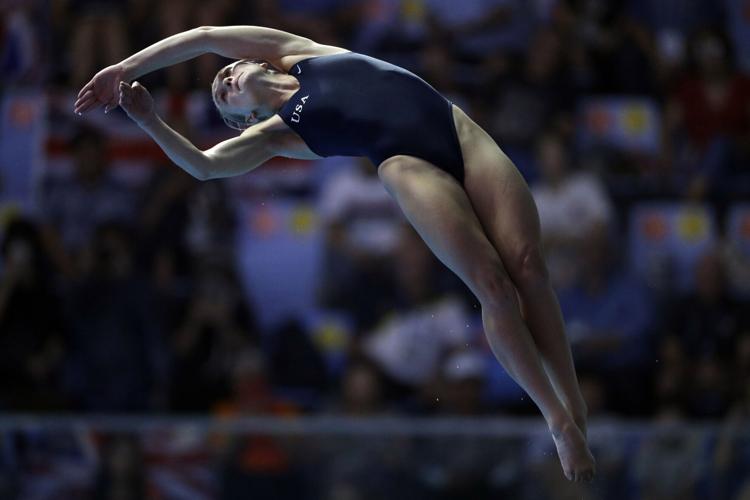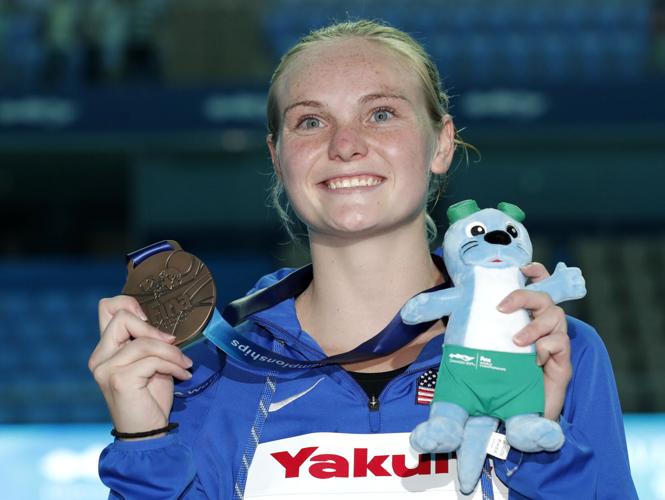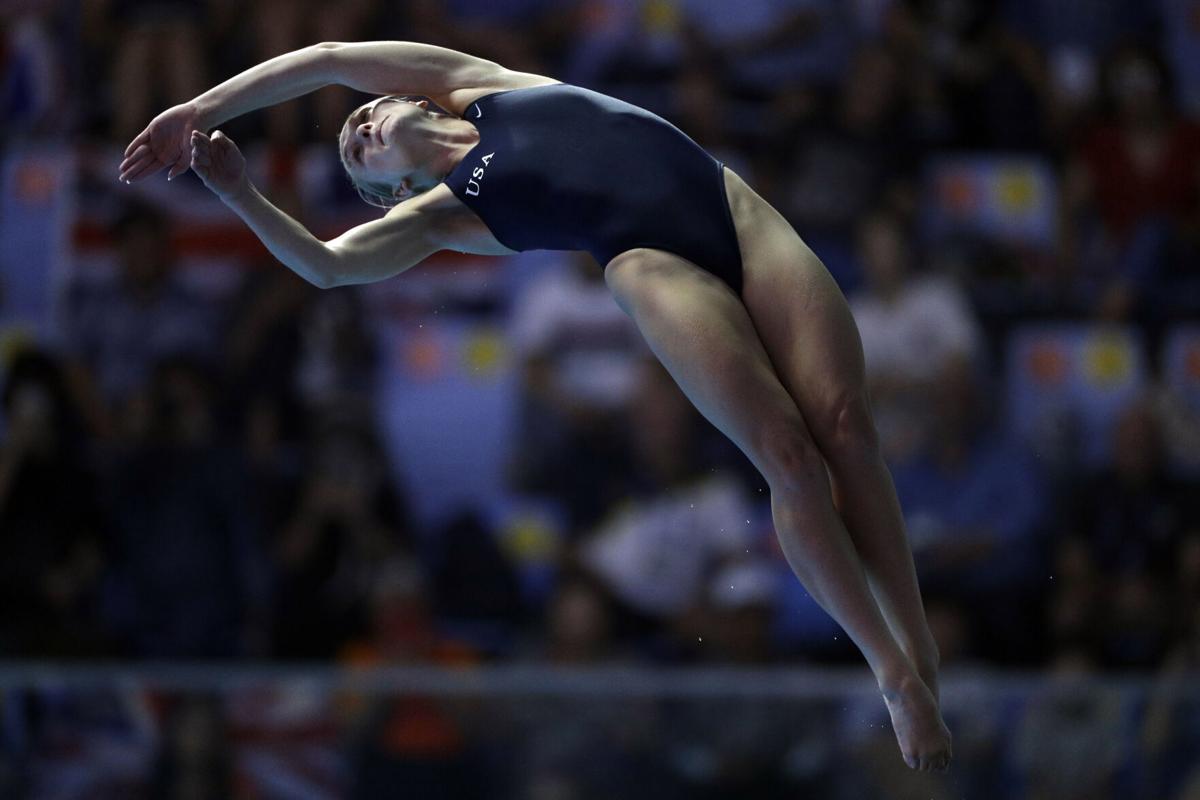It’s been a dream come true for Delaney Schnell.
The diver is now a member of the U.S. Olympic team in two events: the 10-meter synchro and the 10-meter platform.
Yet, it still didn’t seem real — even after her flight to Tokyo was booked and her Team USA swimsuits were delivered to her house.
“It’s a little shock still. Is it really happening? Is it really happening?” Schnell said. “I had this dream since I was 4.”
For the Tucson native and five-time All-American at Arizona, the past year wasn’t a smooth journey.
She endured the Olympic Games being pushed back a year because of the pandemic. And she adjusted when the pools across the city were closed — going back to more dry-land work at her former gymnastics club, where she worked on flips in the foam pits.
Schnell used all of that to her advantage. During the shortened season, she broke a UA school and Pac-12 record on the platform with a score of 383.35. She won the Pac-12 championship in both the 1-meter and platform and was named Pac-12 Diver of the Year.
She was heavily favored at the NCAA meet, and finished as the runner-up in the platform and in fourth in the 1-meter.
Then Schnell would have another hurdle to overcome, and this may have been the largest one. Her synchro partner, Tarrin Gilliland, went down with an injury just weeks before the U.S. Olympic Trials.
There were so many questions in the air and decisions to be made. Would they be able to compete together? If so, and Gilliland isn’t at full strength, could they still make the Olympic team? If Gilliland pulled out of the pairing late, would Schnell be able to find a new partner and what would that look like so close to the Trials?
It was a stressful time for Schnell.
After all, these two were partners in 2016 before Schnell got injured and when they got back together at the end of 2019, it was like no time had passed.
In the end, Schnell ended up pairing with Jess Parratto.
“Hearing your partner is not doing well, it sucks,” Schnell said. “It was hard because synchro is a big trust thing. You’ve got to be able to trust and hearing that, you know, she was struggling, it was hard because you want to know they’re going to be fully prepared … it was concerning.

Delaney Schnell holds up her bronze medal following the women's 10-meter platform diving final at the World Swimming Championships in 2019. "It's really cool to say that I can be an Olympian and that I'm an Olympian forever now," she said. "It's pretty surreal.”
“In synchro, Tarrin and I were great together and I think we had the best chance at getting a medal. … (Parratto) and I get along great, too, and I think it worked out for the best. It was really nice to still have a synchro partner. I know that was Tarrin’s big concern as she didn’t want to leave me without a synchro partner and she was happy that I was able to pair up with Jess in the end and that we made the team.”
Schnell and Parratto aren’t strangers. They also dived together at the 2019 USA Diving Winter National Championships, where the top synchro divers were paired up. Gilliland ended up as Schnell’s partner after their pair won the event.
For Schnell, pairing up with Parratto again is as comfortable as putting on a well-worn hoodie.
“We’re both very similar people and it’s funny because my mom was talking with her mom and saying how ‘Jess tells us you can’t cheer before a dive, you can cheer after,’ and my mom’s laughing because it’s the same thing I was telling my family. We’re just very similar people,” Schnell said.
“I’m a very big tea drinker when it comes to competition. … it’s funny because Jess is actually a tea drinker, too. She has her tea drawer and I have my tea drawer and so we’re both really excited about that. She even messaged me the other day and was like, ‘What if I bought an electric collapsible tea kettle?’ I was like, ‘I think we get one there, but maybe I might be interested in that, just in case.’”
It also made it easier that on the platform, all six of the individuals who were competing for the spots on the Olympic team have “very similar start and take offs and that’s really what matters in diving is that you have similar actions,” Schnell said.
Schnell and Parratto had the same mindset going into the Trials.
“We were both very mentally ready for trials like we were both 100% all in — we really wanted to be on that Olympic team,” Schell said.
“I went to train with her 10 days before (Olympic Trials). We had time to get into each other’s rhythm and be able to pair up and work on timing beforehand. We also spent a lot of time together outside of the pool and I think that helped a lot because, we were finally like, ‘OK, we’re the pair. We’re here for each other and we can focus on that now.’ Jess and I get along very well, and I think it just works.”
The duo took first place at the trials, 41 points ahead of the second pair of Katrina Young and Murphy Bromberg, who are also going to Tokyo.
Schnell took first in her individual event, as well. Making the Olympic team on the synchro side, took “stress off my shoulders of making that team was a huge benefit,” she said.
Schnell was able to focus on the little things and went into the finals knowing she was going to have a good day. Having UA diving coach Dwight Dumais by her side has changed the way approaches the sport from both the mental and performance side of things.
She used to do dive after dive after dive. Now, it’s more visualization and fewer reps to lessen the impact on her body.
Dumais has helped Schnell find the fun again.
“He always tells me ‘Do it for the little girl that started in the first place’ and you know that that one hits me. I was a little 10-year-old when I started diving and that reminds me to look back on those fun memories. The sport is fun, you have to enjoy it if you don’t enjoy it why are you doing it?” Schell said.
Schnell’s focus turned quickly towards Tokyo. A few of the little things she is working on includes as Dumais likes to say, ‘being dangerous six feet from the water.’ These are clean entries and perfected come-outs, which is when you come out of a dive — after spinning three-and-a-half times — and stop before reaching with your hands for the water.
The last time a Wildcat diver competed in the Olympics was in 2008 when Claire Febvay competed for France. Schnell is the first U.S. Olympic Wildcat diver since Michele Mitchell won the silver in back-to-back Games in 1984 and 1988.
Schnell hopes to be the next one to bring home a medal to Tucson and is excited her name is going on the board at UA’s Hillenbrand Aquatics Center.
“It’s really cool to know that there aren’t many divers who have made it, but I would hope that in the future more come in and we can get more Olympians on the board,” Schnell said.
“I’ve represented my country since I was 12 and I love wearing the red, white and blue. It’s one of my favorite things. … It’s really special. I wish more people could experience, but that’s what makes it so special is not everyone gets to — it’s a very, very small percentage of the world that gets to go to the Olympics. It’s really cool to say that I can be an Olympian and that I’m an Olympian forever now. It’s pretty surreal.”






